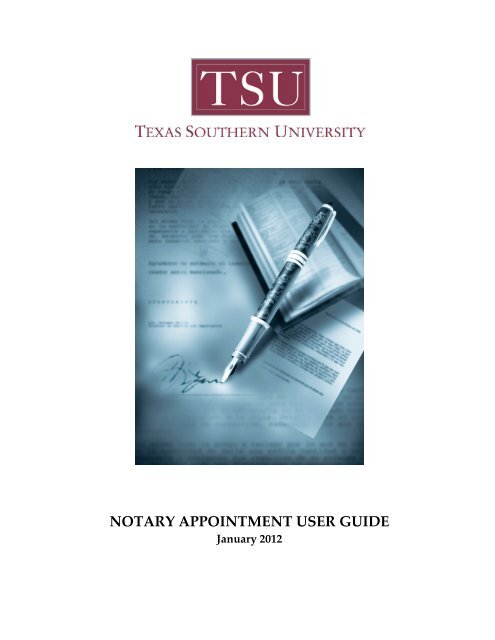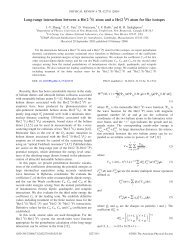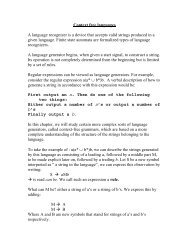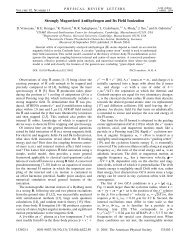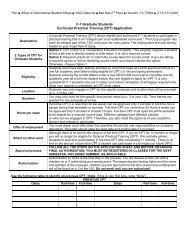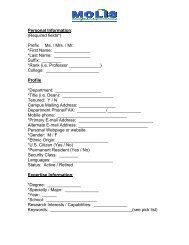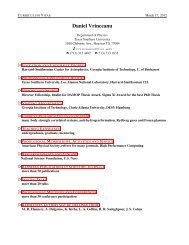NOTARY APPOINTMENT USER GUIDE - Texas Southern University
NOTARY APPOINTMENT USER GUIDE - Texas Southern University
NOTARY APPOINTMENT USER GUIDE - Texas Southern University
You also want an ePaper? Increase the reach of your titles
YUMPU automatically turns print PDFs into web optimized ePapers that Google loves.
<strong>NOTARY</strong> <strong>APPOINTMENT</strong> <strong>USER</strong> <strong>GUIDE</strong><br />
January 2012
INTRODUCTION<br />
The Office of Institutional Compliance is pleased to provide the TSU family with the<br />
FY2012 Notary Appointment User Guide. This guide is for use by faculty and staff<br />
who are interested in becoming a <strong>Texas</strong> Notary without Bond. It provides information<br />
about the Notary without Bond program and application instructions.<br />
If you have any questions or comments about this user guide, please contact the Office<br />
of Institutional Compliance at 713-313-6821.<br />
Office of Institutional Compliance Notary Public Appointment User Guide Page 2
TABLE OF CONTENTS<br />
Introduction ............................................................................................................................ 2<br />
Table of Contents .................................................................................................................. 3<br />
Notary Appointment Procedures ...................................................................................... 4<br />
Statutory Requirements ....................................................................................................... 8<br />
Frequently Asked Questions ............................................................................................ 10<br />
Appendix<br />
Glossary of Terms .................................................................................................... 12<br />
Sample Notarial Forms ........................................................................................... 17<br />
Acknowledgments ........................................................................................ 17<br />
Jurat .................................................................................................................. 20<br />
Verifications ................................................................................................... 20<br />
Oath or Affirmation ...................................................................................... 21<br />
Deposition ...................................................................................................... 21<br />
Protests ............................................................................................................ 22<br />
Certified Copy of a Notarial Record ........................................................ 23<br />
Certified Copy of A Non-Recordable Document ................................. 23<br />
Office of Institutional Compliance Notary Public Appointment User Guide Page 3
<strong>NOTARY</strong> PUBLIC <strong>APPOINTMENT</strong> PROCEDURES<br />
WHAT IS A <strong>NOTARY</strong>?<br />
A notary public is a public official, appointed by the <strong>Texas</strong> Secretary of State, with statewide<br />
jurisdiction. A <strong>Texas</strong> notary public has the same authority as the county clerk to:<br />
1. Take acknowledgement or proofs of written instruments;<br />
2. Protest instruments permitted by law to be protested;<br />
3. Administer oaths;<br />
4. Take depositions; and<br />
5. Certify copies of documents not recordable in the public records.<br />
<strong>Texas</strong> Government Code §406 Subchapter A lists the statutory authority and responsibility of a notary<br />
public.<br />
STEPS TO BECOMING A <strong>NOTARY</strong> FOR A STATE AGENCY<br />
Notary Without Bond Program:<br />
The Office of the <strong>Texas</strong> Secretary of State administers notary public appointments. The State<br />
Office of Risk Management (SORM) manages the Notary without Bond program <strong>Texas</strong><br />
Administrative Code §28.4.252.<br />
As of Sept. 1, 2002, state employees designated by a state agency to be a notary public<br />
are no longer required to purchase a notary bond (H.B. 1203). All other notary<br />
regulations must be followed.<br />
The process for new or renewal of state employee's notary commission without bond is as<br />
follows:<br />
1. Complete the special application for state employees who will not be providing a<br />
notary bond “Application for Appointment as <strong>Texas</strong> Notary Public - No Bond”<br />
(Form #2301-NB) MS Word, Adobe PDF).<br />
2. Read and complete the “State Employee Notary Acknowledgement Form” (Form<br />
#SORM-203 MS Word, PDF).<br />
Office of Institutional Compliance Notary Public Appointment User Guide Page 4
<strong>NOTARY</strong> PUBLIC <strong>APPOINTMENT</strong> PROCEDURES<br />
3. Send the original completed application, original completed acknowledgement form,<br />
and proof of employment to:<br />
State Office of Risk Management<br />
Bonds & Insurance Section<br />
P.O. Box 13777, Austin, <strong>Texas</strong> 78711-3777<br />
Note: All three items must be received at one time.<br />
*Acceptable proof of employment is payment by the state agency or institution of higher<br />
education. Payment/proof of employment can either be:<br />
• A copy of an interagency transaction voucher (ITV) verifying the pre-payment,<br />
transfer of the $11 filing fee (RTI#300300, COBJ-7210, and<br />
TINS#33073073075000) from your agency to the Secretary of State with the<br />
employee's/applicant's name in the USAS transaction description; or<br />
• A state agency/university check for $11, payable to the Secretary of State.<br />
SORM will forward your application to the Secretary of State’s office for commission issuance. Once<br />
the application has been sent to the State Office of Risk Management, please allow a minimum of 5<br />
working days for SORM to process the application. The application is then sent to the Secretary of<br />
State.<br />
Individuals are able to check the status of his/her application by going to the SOS Notary Search page.<br />
The name of the individual can be searched for the status of the application.<br />
Caveat: A special notary stamp is required for a Notary without Bond. The stamp must show "Notary<br />
without Bond" below the bottom border of the notary stamp. The stamp may be purchased at a local<br />
rubber stamp or office supply store.<br />
Office of Institutional Compliance Notary Public Appointment User Guide Page 5
<strong>NOTARY</strong> PUBLIC <strong>APPOINTMENT</strong> PROCEDURES<br />
<strong>NOTARY</strong> EDUCATIONAL MATERIALS<br />
SORM's training division offers information about notary public information for state employees<br />
(http://www.sorm.state.tx.us/Notary/intro.htm), which provides an overview of the Secretary of<br />
State's notary public educational information (http://www.sos.state.tx.us/statdoc/edinfo.shtml) as it<br />
applies to state government.<br />
An online training video is also available: (http://www.sorm.state.tx.us/Media/multimedia.php). To<br />
receive credit in SORM's online training system, please log-in to RMIS<br />
(https://www.sorm.state.tx.us/sorm/pages/SORMLogin.html) and click the "Register for an online<br />
class" link to watch the video.<br />
Office of Institutional Compliance Notary Public Appointment User Guide Page 6
<strong>NOTARY</strong> PUBLIC <strong>APPOINTMENT</strong> PROCEDURES<br />
<strong>NOTARY</strong> FORMS<br />
Form 2301. Application for Appointment as a <strong>Texas</strong> Notary Public—General application and<br />
bond form to become a <strong>Texas</strong> notary. (Word, Acrobat)<br />
Form 2301-E. Application for Appointment as <strong>Texas</strong> Notary Public by Escrow Officer<br />
Residing in Adjacent State. (Word, Acrobat)<br />
Form 2301-NB. Application for Appointment as a <strong>Texas</strong> Notary Public—No Bond. For state<br />
employee applicants only.<br />
Form 2302. Notary Public Change of Address—Form to notify the secretary of state of a<br />
notary public's address change as required by section 406.019, Government Code.<br />
(Word, Acrobat)<br />
Form 2303. Voluntary Surrender of Notary Public Commission—Form to surrender an<br />
unexpired notary public commission. (Word, Acrobat)<br />
Form 2304. Notary Public Complaint—Form to initiate a complaint against a notary public.<br />
(Word, Acrobat)<br />
Form 2305. Application for Change of Name as a <strong>Texas</strong> Notary Public—Form to change the<br />
name on a notary’s commission. (Word, Acrobat)<br />
Form 2305-NB. Application for Change of Name as <strong>Texas</strong> Notary Public Without Bond. For<br />
notaries who are state employees.<br />
Form 2306. Request for Duplicate Notary Public Commission. (Word, Acrobat)<br />
Office of Institutional Compliance Notary Public Appointment User Guide Page 7
STATUTORY REQUIREMENTS<br />
<strong>Texas</strong> Administrative Code<br />
TITLE 28 INSURANCE<br />
PART 4 STATE OFFICE OF RISK MANAGEMENT<br />
CHAPTER 252 STATE RISK MANAGEMENT<br />
SUBCHAPTER E NOTARIES WITHOUT BOND<br />
RULE §252.501 General Provisions<br />
(a) State employees whose duties include service as notaries shall serve without bond and shall not submit a<br />
notary bond or notary bond filing fee with their notary applications. Notaries without bond shall otherwise<br />
meet the general requirements of Government Code, Chapter 406, including but not limited to, maintaining a<br />
notary record book and taking the official oath.<br />
(b) This subchapter shall be applicable only to a state department, commission, board, institution, court, or<br />
institution of higher education or soil conservation district of the state. This subchapter does not apply to other<br />
political subdivisions of the state.<br />
RULE §252.503 Notaries Without Bond--Application Process<br />
(a) Applicants shall complete the Secretary of State (SOS) form 2301-NB and the SORM-201 and provide it to<br />
the employing agency for submission to the Office.<br />
(b) The agency shall submit to the office:<br />
(1) the original SOS form 2301-NB;<br />
(2) the original SORM-203; and<br />
(3) an inter-agency transfer voucher (ITV) payable to the Secretary of State. The employee's name shall appear<br />
in the descriptive legal text (DLT). The ITV shall constitute acceptable proof of the applicant's<br />
state-employment status, to be verifiable through the employing agency at any time.<br />
(c) The Office shall review and forward the approved applications consisting of the SOS form 2301-NB and the<br />
ITV to the Secretary of State for final processing.<br />
RULE §252.505 Agency Duties<br />
(a) The agency shall provide a stamp to the notary upon which "Notary without Bond" is affixed. Information<br />
for ordering the stamp is available on the Office's website or by contacting the Bonds and Insurance Section of<br />
the Office. A notary without bond may not use a stamp unless the stamp contains the additional line reading<br />
"Notary without Bond". Notaries without bond shall use this stamp on all documents notarized pursuant to<br />
their official state duties. The stamp shall comply with all additional notary stamp requirements of the Secretary<br />
of State.<br />
(b) Agencies shall require notaries without bond to attend a notary training class, either provided internally or<br />
externally. Information concerning notary training is available on the Office's website or by contacting the<br />
Bonds and Insurance Section of the Office.<br />
RULE §252.507<br />
Notification Requirements Upon Transfer or Termination of Notaries Without Bond<br />
Office of Institutional Compliance Notary Public Appointment User Guide Page 8
STATUTORY REQUIREMENTS<br />
(a) Upon transfer of any notary without bond to another state agency, the new agency shall immediately notify<br />
the Bonds and Insurance Section of the Office using the SORM-204.<br />
(b) Upon termination of any notary without bond, the terminating agency shall immediately notify the Bonds<br />
and Insurance Section of the Office using the SORM-204.<br />
(c) Notaries without bond should voluntarily resign notary commissions immediately before termination of<br />
state employment or as soon thereafter as practicable. Immediately before termination, each agency shall notify<br />
all notaries without bond of the Office's recommendation. The stamp shall remain with the agency upon<br />
termination of state employment as state property. The original of the notary record book shall remain with the<br />
employee unless the employee resigns the commission, in which case the employee shall comply with<br />
Government Code §406.022.<br />
RULE §252.509<br />
State Employees' Notarization of Documents Outside of State Employment<br />
(a) A state employee is not prohibited from purchasing a notary bond or paying the Secretary of State's bond<br />
filing fee at personal expense. The cost of the notary bond filing fee and bond premium shall not be reimbursed<br />
by any state agency or with any other state funds. State employees who purchase a notary bond shall complete a<br />
standard SOS form 2301 form and follow the filing procedures as established by the Secretary of State.<br />
(b) Notaries without bond who notarize documents outside of their state duties and who fail to use the "Notary<br />
without Bond" stamp shall be subject to disciplinary action by their respective agencies.<br />
Source Note: The provisions of §252.501; §252.503; §252.505; §252.507 and §252.509 adopted to<br />
be effective December 22, 2002, 27 TexReg 11780<br />
Office of Institutional Compliance Notary Public Appointment User Guide Page 9
FREQUENTLY ASKED QUESTIONS<br />
1. How do I determine if my department needs to have a notary?<br />
The department should conduct a self-assessment of what type<br />
of notary services it uses and how often it uses these services.<br />
If the department certifies copies of non-recordable documents,<br />
takes depositions or routinely uses the services of a notary<br />
(four or more times a year), the department may need its own<br />
notary.<br />
2. Do I need to attend a notary training class?<br />
Yes. Notaries without Bond must attend a notary training<br />
class.<br />
3. Is a government employee required to notarize documents for<br />
the general public?<br />
No. The <strong>Texas</strong> Attorney General’s office issued a letter<br />
opinion in 1988 indicating that a notary public who is<br />
employed by a governmental body may refuse to take<br />
acknowledgements for the general public and must refuse<br />
when doing so would interfere with the employee’s discharge of<br />
his or her duties as a public employee. Tex. Atty. Gen. Op.<br />
LO-88-34.<br />
4. Can a private employer restrict the notarial activities of an<br />
employee during work hours?<br />
Yes. The <strong>Texas</strong> Attorney General’s office has issued an<br />
opinion supporting the authority of a private employer to limit<br />
or prohibit the notarial activities of its employees during work<br />
hours. Tex. Atty. Gen. Op. GA-0723.<br />
5. Who is eligible to be a public notary?<br />
To be commissioned as a notary public in <strong>Texas</strong>, you must be<br />
a <strong>Texas</strong> resident at least 18 years of age who has not received<br />
a final conviction for a crime involving moral turpitude or a<br />
felony.<br />
6. Is a notary public seal required?<br />
Yes. The notary public shall authenticate all official acts<br />
with the seal of office. A notary public shall provide a seal of<br />
office that clearly shows, when embossed, stamped, or printed<br />
on a document the words “Notary Public, State of <strong>Texas</strong>”<br />
around a star of five points, the notary public’s name, and the<br />
date the notary public’s commission expires. The stamp for<br />
notaries without bond must show “Notary without Bond”<br />
below the bottom boarder of the notary stamp.<br />
7. Do I need to keep a record book?<br />
Yes. A <strong>Texas</strong> notary public is required to maintain a record<br />
book. This record book must be maintained whether or not<br />
any fees are charged for your notary public service.<br />
8. May I take an acknowledgement over the telephone?<br />
No. The person for whom a notarization is performed must<br />
personally appear before the notary public at the time the<br />
notarization is performed.<br />
9. Can I complete a Form I-9, Employment Eligibility<br />
Verification on behalf of an employer?<br />
No. Although the United States Citizenship and<br />
Immigration Services would allow a notary public to fill out<br />
Form I-9 on the behalf of an employer, <strong>Texas</strong> notaries public<br />
are not provided this authority under <strong>Texas</strong> law. Therefore,<br />
if an employer requests that you complete any portion of a<br />
Form I-9 in your capacity as a notary public, you should<br />
refuse.<br />
10. Who may file a complaint against a notary public?<br />
A person who has been harmed by the actions of a notary<br />
public in performing a specific notarization may file a<br />
complaint with the Secretary of State. The complaint will be<br />
reviewed to determine if the complaint states facts that, if<br />
proven, constitutes grounds for the Secretary of State to take<br />
disciplinary action.<br />
11. What constitutes good cause for the Secretary of State to take<br />
disciplinary action against a notary public?<br />
Good cause includes, but is not limited to, the acts identified<br />
in §406.009(d) of the <strong>Texas</strong> Government Code and in 1<br />
Tex Admin Code §87.11.<br />
12. How long is a notary commission valid and can I be a <strong>Texas</strong><br />
notary if I am no longer a resident of <strong>Texas</strong>?<br />
The term of a notary public expires four years after the date<br />
the notary public qualifies. A notary public who removes his<br />
residence from this state vacates the office.<br />
Office of Institutional Compliance Notary Public Appointment User Guide Page 10
APPENDIX<br />
Office of Institutional Compliance Notary Public Appointment User Guide Page 11
Acknowledgment: a notarial act whereby the<br />
signer of a document admits to an officer of the<br />
state, such as a notary public, that he signed the<br />
document; that he understands the contents of the<br />
document; and that he is aware of the<br />
consequences of executing the document by<br />
signing it. The signer also indicates to the notary<br />
that he signed the document of his own free will<br />
and was not coerced into signing a document that<br />
he did not want to sign. Acknowledgments are<br />
taken from signers of documents such as deeds,<br />
contracts and powers of attorney. By signing the<br />
document the signer agrees to the terms and<br />
conditions of the document. The signer does not<br />
have to sign the document in the presence of the<br />
notary, but the document must display the signer’s<br />
original wet ink signature.<br />
Acknowledgment Certificate: a written<br />
statement usually found on a document just below<br />
the signer’s signature block that records and<br />
certifies the details of the acknowledgment notarial<br />
act that just took place. The certificate must contain<br />
a description of the site of the notarial act, the<br />
name(s) of the person(s) acknowledging their<br />
signing of the document, an indication that an<br />
acknowledgment notarial act was performed; and a<br />
statement that the signer personally appeared<br />
before the notary, understood the contents of the<br />
document and signed the document willingly. The<br />
notary also certifies the date that the<br />
acknowledgment was taken, signs the<br />
acknowledgment notarial certificate and places her<br />
notary seal on the certificate. By signing and sealing<br />
the acknowledgment certificate the notary certifies<br />
as an officer of the state that the acknowledgment<br />
notarial act described indeed took place.<br />
Administer: to discharge the duties of an office; to<br />
give (as in the giving of an oath).<br />
Affiant: the person making an affidavit.<br />
Affidavit: a document in which the affiant makes a<br />
statement and swears or affirms under penalty of<br />
perjury that the information in the statement is the<br />
truth. The affidavit will contain a jurat notarial<br />
certificate. The affiant must sign the statement in<br />
the presence of the notary.<br />
GLOSSARY OF TERMS<br />
Affirmation: a solemn statement of truth made<br />
under penalty of perjury, equivalent by law to an<br />
oath, but without religious significance or reference<br />
to a Supreme Being.<br />
Affix: to attach or impress the notary seal to a<br />
document.<br />
Apostille: a certificate issued by the appropriate<br />
office of a state government (for example, the<br />
Governor, Lt. Governor, Secretary of State,<br />
Treasurer, etc. depending on the state) for purposes<br />
of authenticating a notary's signature and official<br />
status as a notary on a particular date. An apostille<br />
may be required for a notarized document that is<br />
bound for a foreign country that participates in<br />
the 1961 Hague Convention Abolishing the<br />
Requirement of Legalization for Foreign Public<br />
Documents. Obtaining an apostille is the<br />
responsibility of the document custodian, not the<br />
notary.<br />
Attest: to bear witness to, to sign a document as a<br />
witness, or to affirm as true.<br />
Attestation Clause: the statement a witness signs<br />
who is attesting the signature of a document as a<br />
witness.<br />
Attested Copy: A copy of an original document<br />
that was made by the notary, or that the notary<br />
witnessed someone else make. Notaries in some<br />
states are allowed to make an attested copy of an<br />
original document if it is not a vital record (see<br />
below) or recordable document (see below). These<br />
states differentiate between an attested copy which<br />
may be made by a notary, and a certified copy<br />
which may be made only by the public official who<br />
has custody of the original record.<br />
Attorney-in-Fact: the person authorized by a<br />
power of attorney to act on behalf of another.<br />
Authentication: a process by which the designated<br />
office that issues authentication's for a state<br />
government (for example, the Governor, Lt.<br />
Governor, Secretary of State, Treasurer, etc.<br />
depending on the state) certifies the signature and<br />
official status of a notary public on a particular date.<br />
An "Apostille" or "Certificate of Authority" is<br />
Office of Institutional Compliance Notary Public Appointment User Guide Page 12
attached to the notarized document, depending on<br />
the document's destination. (See the definition of<br />
Apostille for additional information.) Most<br />
commonly, authentications are requested for<br />
notarized documents that are bound for a foreign<br />
country. Obtaining an apostille or certificate of<br />
authority is the responsibility of the document<br />
custodian, not the notary.<br />
Bill of Sale: a document that passes title of<br />
personal property.<br />
Certification Authority (CA): a trusted party that<br />
issues computer-readable tokens, called digital<br />
certificates, that prove the identity of people using<br />
digital signatures to sign electronic documents.<br />
This is done by a certification company obtaining<br />
proof of identity similar to what notaries do when<br />
performing a notarial act. The CA then creates a<br />
digital certificate that is associated with that<br />
individual’s digital signature.<br />
Certified Copy: a copy of a document or record,<br />
signed and certified as a true copy by the public<br />
official who has custody of the original record (for<br />
example, the local clerk of courts or state<br />
department of vital statistics). The term "certified<br />
copy" sometimes is used interchangeably with<br />
"attested copy" (see above), even though these are<br />
two different things.<br />
Certify: to authenticate or attest as being true or as<br />
represented.<br />
Civil Action: a lawsuit or legal action between two<br />
or more parties.<br />
Codicil: a document that modifies the terms of a<br />
will.<br />
Coerce, Coercion: to make someone feel they<br />
must do something (such as sign a document) when<br />
they do not want to do so.<br />
Commission: the action of each state’s appointing<br />
authority to appoint someone as a notary<br />
public. The certificate issued by the appointing<br />
authority in each state to announce that<br />
appointment.<br />
GLOSSARY OF TERMS<br />
Conveyance: a document affecting or changing<br />
the title/ownership of real property.<br />
Copy Certification: the process in which the<br />
notary takes an affidavit from the document<br />
custodian stating that the document to which the<br />
affidavit is attached is a true and complete copy of a<br />
document that is neither a vital record (see below)<br />
or publicly recordable document (see Recordable<br />
Document below).<br />
Credible Witness (allowed in many, but not all,<br />
states): Where allowed, a credible witness provides<br />
a way to positively identify a signer who lacks<br />
satisfactory identification documents. The credible<br />
witness must be able to truthfully swear an<br />
oath/affirmation that: he/she personally knows the<br />
signer; the signer has no other form of acceptable<br />
identification; such identification would be difficult<br />
or impossible for the signer to obtain; and the<br />
credible witness has no connection to the<br />
underlying transaction. If one credible witness is<br />
used, he/she must be personally known to both the<br />
notary and the signer. If two credible witnesses are<br />
used, they must personally know the signer and be<br />
able to present the notary with positive<br />
identification. (State statutes differ on allowing use<br />
or one or two credible witnesses – see State<br />
Information.)<br />
Custodian of the Document: the person who has<br />
charge or custody of the document. In the case of<br />
making an attested photocopy, the “document’s<br />
custodian” is the person presenting the document,<br />
who may or may not be the document signer or a<br />
party named in the document.<br />
Deed: a document by which a person conveys<br />
(transfers) real property.<br />
• Quitclaim Deed: a deed intended to pass any<br />
title, interest, or claim which the grantor may have<br />
in the real property, but not professing that such<br />
title is valid or containing any warranty for title.<br />
• Warranty Deed: a deed in which the grantor<br />
warrants or guarantees good clear title to the real<br />
property.<br />
Deponent: the person giving sworn testimony in a<br />
deposition.<br />
Office of Institutional Compliance Notary Public Appointment User Guide Page 13
Deposition: the testimony of a witness, under<br />
oath or affirmation, taken outside of court in which<br />
lawyers ask oral questions of the deponent. The<br />
testimony is usually reduced to writing and duly<br />
authenticated and is intended to be used in a trial of<br />
a civil action or a criminal prosecution.<br />
Digital Signature: a specific type of electronic<br />
signature used to denote encryption technology. It<br />
is a process that provides for a secure signature on<br />
an electronic document, one that can prove the<br />
signature belongs to the person who signed it, and<br />
that can be associated with the document in such a<br />
way that any modifications to the document<br />
invalidate the signature.<br />
Document Custodian: the person who has<br />
charge or custody of the document. In the case of<br />
making an attested copy, the document custodian<br />
is the person presenting the document, who may or<br />
may not be the document signer or a party named<br />
in the document.<br />
Electronic Notarization: the process of<br />
performing a notarial act according to the<br />
applicable states laws on an electronic document,<br />
rather than a paper document.<br />
Electronic Signature: any electronic character,<br />
symbol, letter, sound, or process that has been<br />
attached to or logically associated with an<br />
electronic record, and executed or adopted by a<br />
person with the intent that it shall be his signature.<br />
Escrow: putting documents, property, or funds in<br />
the hands of an independent third party.<br />
Execute a Document: to perform all formalities<br />
necessary to make a document fully effective. This<br />
is often a matter of just signing, but may also<br />
require a notarial act, delivery, or other element.<br />
Executor: a person in charge of carrying out the<br />
provisions of a will.<br />
Free Act and Deed: sometimes found in<br />
acknowledgment notarial certificates (see<br />
Acknowledgment Certificate above) to indicate<br />
that the signer was not coerced (see Coerce,<br />
Coercion above) into signing the document.<br />
GLOSSARY OF TERMS<br />
Grantee: a person (usually the buyer) who receives<br />
the deed of real property from the grantor.<br />
Grantor: a person (usually the seller) who transfers<br />
a deed of real property to the grantee.<br />
Guardian: a person in charge or a minor and/or<br />
their property.<br />
Identification Document: in the event a notary<br />
does not personally know (see Personally Known<br />
below) the signer, the notary may accept an<br />
identification document that is deemed acceptable<br />
by the state notary law.<br />
Instrument: this may be a written document, or an<br />
electronic document. As used in notarial law and<br />
practice, an instrument is a document that requires<br />
a signature and a notarial act to be fully executed.<br />
Jurat: the written notarial certificate found on an<br />
affidavit, application or other document, indicating<br />
that the signer swore or affirmed to the notary<br />
under penalty of perjury that the information in the<br />
document is the truth. It also certifies that the<br />
signer signed the document in the presence of the<br />
notary on the date indicated in the jurat.<br />
L.S. (locus sigilli): “the location where the seal is<br />
placed” in Latin.<br />
Lien: a legal right or security attached to real estate<br />
or personal property until the payment of some<br />
debt, obligation, or duty.<br />
Malfeasance: the doing of an act which a person<br />
should not do at all.<br />
Misfeasance: the improper doing of an act which<br />
a person might do lawfully.<br />
Mortgage on Real Property: a document creating<br />
a lien on a property.<br />
Negligence: the failure to use such care as a<br />
reasonably prudent and careful person would use<br />
under similar circumstances.<br />
Notarial Act: an official act that a notary public is<br />
authorized to perform by statute.<br />
Office of Institutional Compliance Notary Public Appointment User Guide Page 14
Notarial Certificate: a written statement signed<br />
and sealed by the notary public certifying the facts<br />
of the notarial act performed immediately prior to<br />
filling out the notarial certificate.<br />
Oath: any form of attestation or pledge by which a<br />
person signifies that he/she is bound in conscience<br />
and out of a sense of responsibility to a Supreme<br />
Being to the truthfulness of some<br />
statement. Willingly swearing to untrue statements<br />
constitutes perjury.<br />
Original Document: for purposes of performing<br />
a notarial act (over a paper document), an original<br />
document is one that contains the signer’s wet-ink<br />
signature (see Original Signature) or that will be<br />
signed by the signer in the presence of the notary.<br />
An original electronic document is that to which<br />
the signer has affixed his/her electronic signature.<br />
Original Signature: a signature subscribed<br />
(signed) directly onto the (paper) document in ink<br />
(wet-ink) by the person who is named on the<br />
document. In contrast, a faxed document that<br />
already displays a signature does not display an<br />
original signature, since the signature on the faxed<br />
document is a facsimile. An original electronic<br />
signature is an electronic sound, symbol or process<br />
that is affixed to an electronic document by the<br />
signer, with the intent of executing the document.<br />
Perjury: making a false statement under oath or<br />
affirmation. Perjury is a crime punishable by a fine<br />
and/or prison term.<br />
Personally Known: refers to knowing a person for<br />
a period of time and under circumstances which<br />
leave you no doubt as to that person’s true identity.<br />
Power of Attorney (POA): a document<br />
authorizing a person to act as another’s agent or<br />
representative. (see Attorney-in-Fact above and<br />
Principal below)<br />
Principal: the person who signs the power of<br />
attorney to allow the attorney-in-fact to have<br />
certain powers to act on behalf of the principal.<br />
Proof: a declaration made by a subscribing witness<br />
usually stating that he/she witnessed the signature<br />
of the signer of the document.<br />
GLOSSARY OF TERMS<br />
Protest: a formal declaration made by a notary<br />
declaring a default in payment on a promissory<br />
note.<br />
Reasonable Care: the degree of care which a<br />
person of ordinary prudence and intelligence would<br />
exercise in the same circumstances. Failure to<br />
exercise such care is negligence.<br />
Recordable Document: a document that the<br />
recording authority (clerk of the county court, for<br />
example) is authorized to record, usually by state<br />
statute. Certified copies of a recordable document<br />
may not be made by a notary public. A certified<br />
copy of a recordable document must be obtained<br />
from the recording authority.<br />
Representative Capacity: having the authority to<br />
act for and on behalf of a person, corporation,<br />
partnership, trust, or other entity as:<br />
• An authorized officer, agent, or partner;<br />
• A public officer, personal representative, or<br />
guardian;<br />
• An attorney-in-fact for a principal;<br />
• An authorized representative or in any other<br />
capacity recited in the instrument.<br />
S.S. (scilicet): “to wit, namely” in Latin. Archaic<br />
term generally used to indicate the exact location of<br />
the performance of a notarial act. “S.S.” is usually<br />
found near the venue (see below) on a notarial<br />
certificate.<br />
Statute: a law established by legislation.<br />
Statute of Limitations: a law that sets a time limit<br />
on initiating criminal prosecution or a civil action.<br />
Subpoena: a writ that compels a person to testify<br />
in a proceeding.<br />
Subscribe: to place one’s signature on a document,<br />
either as the signer of the document or as a witness<br />
to the signer’s signature.<br />
Swear: to take an oath.<br />
Testator: the person making a will.<br />
Office of Institutional Compliance Notary Public Appointment User Guide Page 15
Venue: the location where the notarial act takes<br />
place, usually stated in the following format at the<br />
beginning of the notarial certificate:<br />
State of _________<br />
County of ________<br />
Vital Record: an original document held by a state<br />
agency (or sometimes also held by the county of<br />
record) having to do with the birth, marriage,<br />
divorce, or death of an individual. Some states will<br />
include adoption documents and codicils made to<br />
correct mistakes on an original record as vital<br />
records. A certified copy of a vital record must be<br />
obtained from the agency that holds the original<br />
vital record. A notary may not certify a copy of a<br />
vital record.<br />
Will: an instrument by which a person makes a<br />
disposition of his or her property to take effect<br />
after his or her death.<br />
Witness: to observe the execution of, as that of an<br />
instrument, or to sign one’s name to an<br />
instrument, to authenticate it (attest it).<br />
GLOSSARY OF TERMS<br />
Office of Institutional Compliance Notary Public Appointment User Guide Page 16
SAMPLE FORMS<br />
“Personalized Seal” in the following examples means a seal containing the<br />
words "Notary Public, State of <strong>Texas</strong>" around a star of five points, the notary<br />
public's name, and the date the notary public's commission expires.<br />
ACKNOWLEDGMENTS<br />
I. Form for Ordinary Certificate of Acknowledgment<br />
State of <strong>Texas</strong> County of _______________<br />
Before me, (insert the name and character of the officer), on this day personally<br />
appeared ____________________, known to me (or proved to me on the oath<br />
of______________ or through (description of identity card or other document) to<br />
be the person whose name is subscribed to the foregoing instrument and<br />
acknowledged to me that he executed the same for the purposes and<br />
consideration therein expressed.<br />
Given under my hand and seal of office this __________ day of<br />
__________, (year).<br />
(Personalized Seal) Notary Public's Signature<br />
II. Short Forms<br />
A. For a natural person acting in his/her own right:<br />
State of <strong>Texas</strong> County of _______________<br />
This instrument was acknowledged before me on (date) by (name or names of<br />
person or persons acknowledging).<br />
(Personalized Seal) Notary Public's Signature<br />
Office of Institutional Compliance Notary Public Appointment User Guide Page 17
SAMPLE FORMS<br />
B. For a natural person as principal acting by attorney-in-fact:<br />
State of <strong>Texas</strong> County of _______________<br />
This instrument was acknowledged before me on (date) by (name of attorney-infact) as<br />
attorney-in-fact on behalf of (name of principal).<br />
(Personalized Seal) Notary Public's Signature<br />
C. For a partnership acting by one or more partners:<br />
State of <strong>Texas</strong> County of _______________<br />
This instrument was acknowledged before me on (date) by (name of<br />
acknowledging partner or partners), partner(s) on behalf of (name of<br />
partnership), a partnership.<br />
(Personalized Seal) Notary Public's Signature<br />
D. For a corporation:<br />
State of <strong>Texas</strong> County of _______________<br />
This instrument was acknowledged before me on (date) by (name of officer), (title<br />
of officer) of (name of corporation acknowledging), a (state of incorporation)<br />
corporation, on behalf of said corporation.<br />
(Personalized Seal) Notary Public's Signature<br />
Office of Institutional Compliance Notary Public Appointment User Guide Page 18
SAMPLE FORMS<br />
E. For a public officer, trustee, executor, administrator, guardian, or<br />
other representative:<br />
State of <strong>Texas</strong> County of _______________<br />
This instrument was acknowledged before me on (date) by (name of<br />
representative) as (title of representative) of (name of entity or person<br />
represented).<br />
(Personalized Seal) Notary Public's Signature<br />
F. Form of Certificate for Proof by Witness<br />
State of <strong>Texas</strong> County of _______________<br />
Before me, (insert the name and character of the officer), on this day personally<br />
appeared ____________________, known to me (or proved to me on the oath of<br />
______________), to be the person whose name is subscribed as a witness to the<br />
foregoing instrument of writing, and after being duly sworn by me stated on oath<br />
that he saw _______, the grantor or person who executed the foregoing<br />
instrument, subscribe the same (or that the grantor or person who executed such<br />
instrument of writing acknowledged in his presence that he had executed the<br />
same for the purposes and consideration therein expressed), and that he had<br />
signed the same as a witness at the request of the grantor (or person who<br />
executed the same.)<br />
Given under my hand and seal of office this __________ day of<br />
__________, (year).<br />
(Personalized Seal) Notary Public's Signature<br />
Office of Institutional Compliance Notary Public Appointment User Guide Page 19
SAMPLE FORMS<br />
JURAT<br />
State of <strong>Texas</strong> County of _______________<br />
Sworn to and subscribed before me on the __________ day of<br />
_______________, (year), by (name of signer).<br />
(Personalized Seal) Notary Public's Signature<br />
VERIFICATIONS<br />
Form 1:<br />
State of <strong>Texas</strong> County of _______________<br />
_______________, personally appeared before me, and being first duly sworn<br />
declared that he/she signed this application in the capacity designated, if any,and<br />
further states that he/she has read the above application and the statements<br />
therein contained are true.<br />
(Personalized Seal) Notary Public's Signature<br />
Form 2<br />
State of <strong>Texas</strong> County of _______________<br />
Before me, a notary public, on this day personally appeared _______________,<br />
known to me to be the person whose name is subscribed to the foregoing<br />
document and, being by me first duly sworn, declared that the statements therein<br />
contained are true and correct.<br />
(Personalized Seal) Notary Public's Signature<br />
Office of Institutional Compliance Notary Public Appointment User Guide Page 20
SAMPLE FORMS<br />
OATH OR AFFIRMATION<br />
State of <strong>Texas</strong> County of_______________<br />
I, (affiant), do solemnly swear (or affirm), that I will faithfully execute the duties<br />
ofthe office of ___________________ of the State of <strong>Texas</strong>, and will to the best of<br />
my ability preserve, protect, and defend the Constitution and laws of the United<br />
States and of this State, so help me God.<br />
Signature of Affiant<br />
Sworn to and subscribed before me by (affiant) on this __________ day of<br />
_______________, (year).<br />
(Personalized Seal) Notary Public's Signature<br />
DEPOSITION<br />
Certificate to Deposition Upon Written Questions<br />
State of <strong>Texas</strong> County of _______________<br />
(Plaintiff) v. (Defendant)<br />
) In the __________ Court<br />
) of __________ County, <strong>Texas</strong><br />
) Cause No. _________<br />
I hereby certify that the foregoing answers of __________, the witness<br />
forenamed, were signed and sworn to before me on (date), by said witness.<br />
(Personalized Seal) Notary Public's Signature<br />
Office of Institutional Compliance Notary Public Appointment User Guide Page 21
SAMPLE FORMS<br />
PROTESTS<br />
(Insert bill or note or copy thereof)<br />
United States of America State of <strong>Texas</strong> County of _______________<br />
Be it known that on the __________ day of __________, (year), at the request<br />
of (name), of __________, I, (notary public's name), a notary public duly<br />
commissioned and sworn, residing in __________ County, <strong>Texas</strong>, did present the<br />
original (instrument), hereto attached, for $__________, with accrued interest<br />
thereon of $__________, dated __________, and demanded payment (or<br />
acceptance) thereof, which was refused.<br />
Whereupon I, at the request of the aforesaid __________, did protest, and by<br />
these presents do protest, as well against the drawer, maker, endorsers, and<br />
acceptors of said instruments as against all others whom it may concern, for<br />
exchange, costs, charges, damages, and interest already incurred and hereinafter<br />
to be incurred by reason of non-payment thereof. I further certify that<br />
on (date), notice in writing of the foregoing presentment, demand, refusal and<br />
protest was given by(persons and status) by depositing notices thereof in the post<br />
office at __________, <strong>Texas</strong>, postage paid, directed as follows:<br />
____________________. I further certify that notices were left as follows:<br />
Notice left for _______________ at _______________<br />
Notice left for _______________ at _______________<br />
Each of the named places the reputed place of residence of the person for whom<br />
the notice was left.<br />
In testimony whereof I have hereunto set my hand and affixed my seal of office at<br />
__________, <strong>Texas</strong>, on __________ day of ________________, (year).<br />
(Personalized Seal) Notary Public's Signature<br />
Office of Institutional Compliance Notary Public Appointment User Guide Page 22
SAMPLE FORMS<br />
CERTIFIED COPY OF A NOTARIAL RECORD<br />
State of <strong>Texas</strong> County of _______________<br />
On this __________ day of __________, (year), I certify, pursuant to Tex. Gov’t<br />
Code §406.014(c), that the preceding or attached document is a true, exact,<br />
complete, and unaltered copy made by me of (description of notarial record), the<br />
original of which is held in my custody as a notarial record.<br />
(Personalized Seal) Notary Public's Signature<br />
CERTIFIED COPY OF A NON-RECORDABLE DOCUMENT<br />
State of <strong>Texas</strong> County of _______________<br />
On this __________ day of __________, (year), I certify that the preceding or<br />
attached document, is a true, exact, complete, and unaltered copy made by me of<br />
(description of document), presented to me by the document's<br />
custodian,_______________, and that, to the best of my knowledge, the<br />
photocopied document is neither a public record nor a publicly recordable<br />
document, certified copies of which are available from an official source other than<br />
a notary.<br />
(Personalized Seal) Notary Public's Signature<br />
Office of Institutional Compliance Notary Public Appointment User Guide Page 23


